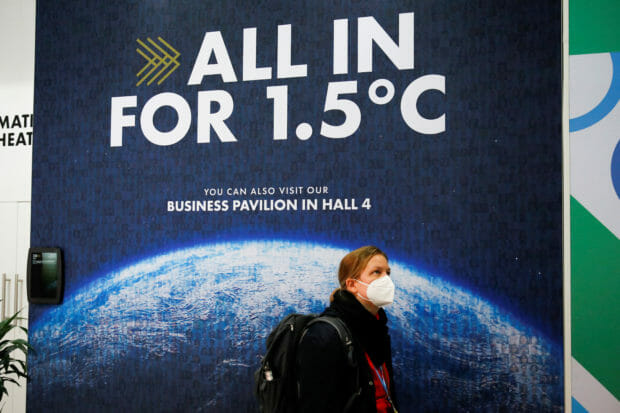G20 economies slow pace of decarbonization, PwC study shows

FILE PHOTO: A delegate walks past a climate change poster at the UN Climate Change Conference (COP26) in Glasgow, Scotland, Britain, November 1, 2021. REUTERS/Phil Noble
Decarbonization rates in the Group of Twenty (G20) economies slumped to their lowest level in two decades last year, consulting firm PwC said, falling short of what is needed to reach the world’s climate goal.
PwC said the pace of change needed to pick up to get back on track with an objective of capping global warming at 1.5 degrees Celsius.
“No country in the G20 is decarbonising quickly enough to maintain a safe climate,” PwC Net Zero Economy Index showed.
Global decarbonization fell to 0.5%, a long way below the 12.9% required to keep temperature rises in line with the target, while in the G20, it landed at just 0.2%.
Dan Dowling, partner at PwC UK, said in a statement the world was falling “alarmingly” short of the rate needed to meet the Intergovernmental Panel on Climate Change’s 2030 deadline to reduce emissions by 43%.
The next round of global climate talks is in November.
The average global rate of decarbonization must now reach 15.2% year-on-year, the PwC analysis revealed, 11 times faster than that achieved since 2000.
Nine out of the G20 economies, which together account for around 80% of global energy-related emissions, increased their carbon intensity in 2021, PwC said, based on levels of energy consumption relative to their GDP and its carbon content.
South Africa was the strongest performer, with a decrease of 4.6%, followed by Australia at 3.3% and China at 2.8%.
“Nations must make radical changes to both their energy mix and their energy usage,” Dowling said. “If we fail, the costs of adapting to climate change will continue to increase.”
“Simply put, we do not have enough time for poor decarbonization performance to become the norm, regardless of unexpected events, and whatever their magnitude,” he added.